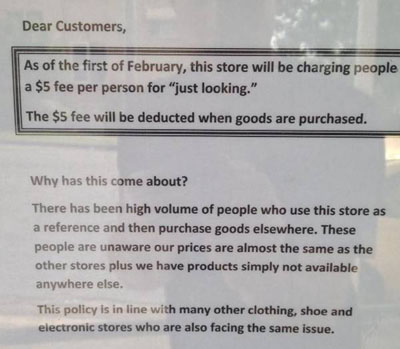- Qualcomm Launches Snapdragon 4 Gen 2 Mobile Platform
- AMD Launches Ryzen PRO 7000 Series Mobile & Desktop Platform
- Intel Launches Sleek Single-Slot Arc Pro A60 Workstation Graphics Card
- NVIDIA Announces Latest Ada Lovelace Additions: GeForce RTX 4060 Ti & RTX 4060
- Maxon Redshift With AMD Radeon GPU Rendering Support Now Available
Showrooming – A Commentary on How NOT to Combat It
A story about a specialty food store in Brisbane, Australia, of all places, caught our eye. The story is of Celiac Supplies, which proclaims itself as “Brisbane’s First & Only Gluten Free Grocery Store,” taking steps to curb “showrooming.” Specifically, the store will be charging a $5.00 fee per head for each person entering the store. The fee will be deducted when you buy something.
First, what is “showrooming”? Basically, it’s the practice of going into a brick-and-mortar store to have a look at products, then deciding to buy them somewhere else (but usually online). The practice is cited by some struggling businesses (in the USA, Best Buy is probably the most famous example) as a reason for their difficulties.

Celiac Supplies posted a note on its window, seen above, notifying all who wanted to enter the store of its new anti-showrooming policy.
The note reads:
As of the first of February, this store will be charging people a $5 fee per person for “just looking.”
The $5 fee will be deducted when goods are purchased.
Why has this come about?
There has been high volume of people who use this store as a reference and then purchase goods elsewhere. These people are unaware our prices are almost the same as the other stores plus we have products simply not available anywhere else.
This policy is line with many other clothing, shoe and electronic stores who are also facing the same issue.
Now, why are we sharing this story on Techgage? Techgage is a consumer-focused site. Celiac Supplies’ anti-showrooming policy feels like a fairly hostile measure against customers. Something seems very wrong about giving money to any business without getting anything – products or services – in return. It doesn’t really matter that the business may state its justification for wanting money from you just to enter its premises. At the end of the day, consumers must always have the final prerogative and the power of choice as to whether or not they give their money to any business. Demanding money up front, just to enter the store, feels very wrong.
Before anyone mentions cover charges at a bar or at a club, it’s not quite the same. At establishments like these, you pretty much are guaranteed to be getting something, whether it’s a drink or to participate in activities like dancing or watching bands play live. You know you’re getting something, so cover charges aren’t quite analogous.
The irony is, given how overtly hostile this tactic to combat showrooming feels, it can only be detrimental. It’s bad for customers (they’ll feel like they’re being attacked), and it’s equally bad for businesses (customers would be discouraged from even entering the store if they are penalized up front for a later decision to not buy from the store for whatever reason).
Can you imagine if stores like Best Buy adopted a policy like this?



